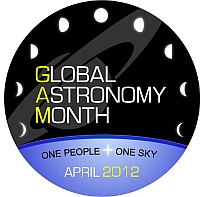
Österreichischer Astronomietag 2012 (2)
|
Austrian Astronomy Day 2012 (2)
|

AstronomietagFür nahezu alles gibt es einen "Tag" im Jahr, an dem das dedizierte Thema in den Vordergrund gerückt wird. Es gibt aber keinen einheitlichen Astronomietag, vor allem mangels internationaler Koordination. Die Astronomical League propagiert zwei Termine im Jahr 2012, im Frühling am 28. April und im Herbst am 20. Oktober. Dem ersten Termin schloss sich Österreich an, abweichend von Deutschland und der Schweiz. Der zunehmende Halbmond, hoch am Himmel, ist natürlich die primäre Attraktion im Frühlng. Da die Wetterbedingungen im März bei uns noch recht winterlich sein können - was sie heuer nicht waren - fiel die Entscheidung auf den 28. April. |
Astronomy DayFor almost everything there is some dedicated "day" in the year at which we celebrate, remember or whatever else. For astronomy, there are serveral days, due to the lack of some international coordination. The Astronomical League fixed the dates in 2012 in the spring on April 28, 2012 and in the fall on October 20, 2012. So did Austria, at least for spring, and in contradiction to Germany and Switzerland. Of course, at spring astronomy day, the waxing Moon near first quarter high up in the sky is the primary eye catcher. As the weather conditions in March could be quite winterly in our county - what they were not this year - the decision fell to April 28. |
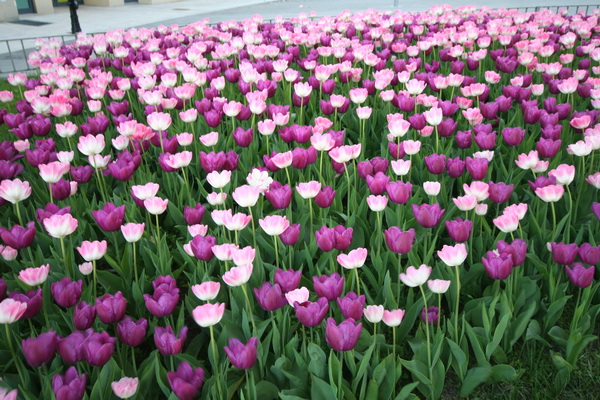
Frühling auf dem Kahlenberg/Spring at Kahlenberg
Global Star PartyIm Rahmen und als Abschluss des von "Astronomen ohne Grenzen" veranstalteten "Globalen Astronomiemonats" findet heute auch das "Globale Teleskoptreffen" statt. Ziel dieser Veranstaltung ist, dass angesichts der Begeisterung für den Himmel über uns alle nationalen, kulturellen und politischen Grenzen verblassen. Aber was sollten wir dazu beitragen? Uns einfach mit unseren Teleskopen an einem unserer gewohnten Plätze treffen? Nein, wir beschlossen, auf den Kahlenberg zu gehen, wo Einheimische und Touristen in gleicher Weise das Panorama bewundern. Dort wollen wir so vielen wie möglich den Himmel näher bringen. |
Global Star PartyAs part of Global Astronomy Month, Astronomers Without Borders scheduled Global Star Party for this date as well. Global Star Party is the ultimate event in this month. It is amazing that when we turn our gaze upward all religious, national, cultural and political barriers fade into the darkness. But what should we do? Meet with our telescopes at some favorite place and just be together? No, we decided to go to Kahlenbeg, where both local residents and tourists enjoy the panoramic view, and share the sky with as may people as possible. |
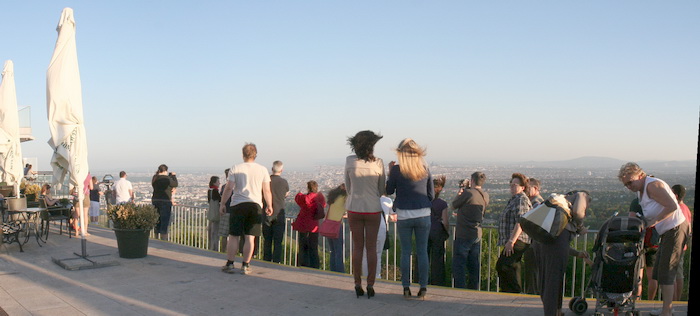
Einheimische und Touristen genießen das Panorma/Local Residents and tourists enjoy the panorma
AufbauKeine einzige Wolke zeigt sich am Himmel. Eigentlich das optimale Wetter für einen Astronomietag, wäre da nicht der stürmische Wind, der konstant aus Südosten bläst. Er hindet uns, Informationszelt und Tafeln aufzustellen und wir bauen nur die Teleskope auf. |
Setting the sceneNot a single cloud shows in the sky. This would be the optimal weather for a public astronomy evening, were it not for the stormy wind constantly blowing from the southeast. It prevents us from setting up displays and we decide to set up telesopces only. |

Wien in der Abendsonne/Vienna in the evening sun
|
Kaum haben wir mit dem Aufbau der Teleskope begonnen, beginnen die neugierigen Fragen. "Ist heute eine besondere Konstellation?". Nein, heute ist Astronomietag, und wir sind hier, um den Himmel zu zeigen. "Wieviel kostet das?". Nein, das kostet nichts, und wir laden alle ein, später mit uns einen Blick zu Mond, Venus und den anderen schönen Objekten zu werfen. |
As soon as we set up the telescopes, people start to ask questions. "Is there a rare constellation tonight?". No, tonight we celebrate Astronomy Day and we are here to share the sky with you. "How much does this cost?". We tell everybody that this is for free and invite them to look at the Moon, Venus and other splendors in the sky later. |
|
|
|
|
|
|
Es wird dunkel |
Nightfall |
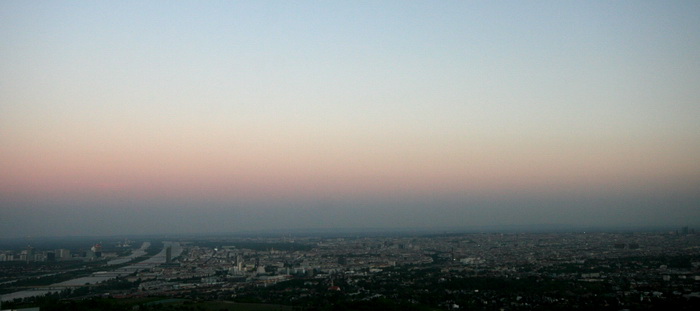
Abenddämmerung und Erdschatten/Dusk and Earth's Shadow
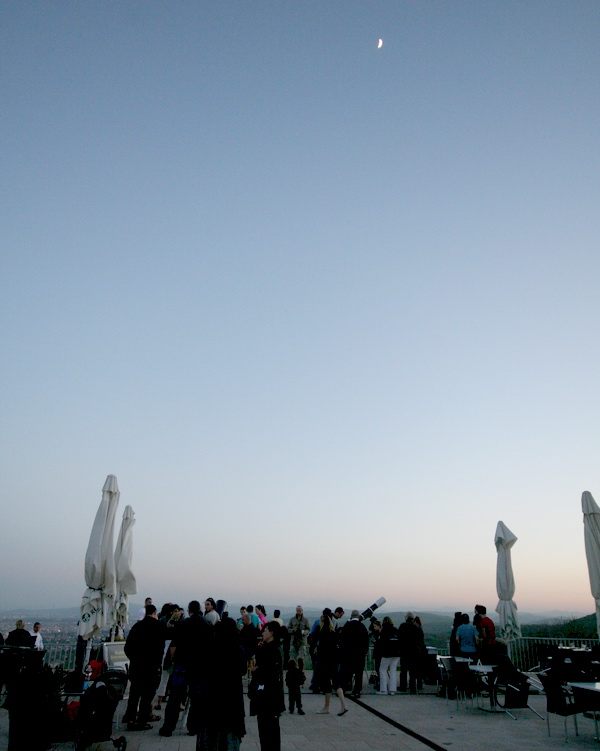
Der Mond hoch am Himmel/The Moon high up in the sky
Der AbendsternDer Mond steht hoch am Himmel, doch bald nach Sonnenuntergang ist Venus ein ebenso beeindruckendes Objekt. Besucher trauen ihren Augen nicht, als sie im Fernrohr die kleine Sichel erblicken. Nein, das ist nicht der Mond. Das ist unser Schwesterplanet! |
The Evening StarThe Moon stands high in the sky, but soon after sunset the planet Venus becomes a prominet view in the sky. Visitors looking through the telescopes cannot believe their eyes when the recognize the tiny crescent planet. No, this is not the Moon - it's our sister planet! |
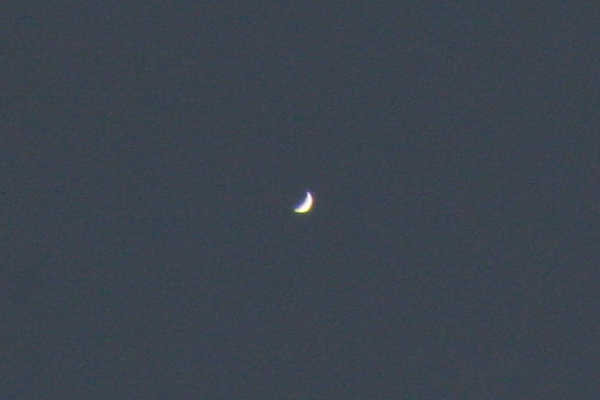
Venus
|
|
|
|
Der MondDer allererste Blick durch eine Teleskop kann enttäschend sein. Aber wer den Mond in der richtigen Phase sieht, ist stets begeistert. Das ist es, was Menschen von einem Blick durch ein Fernrohr erwarten: Auf der Oberfläche einer fremden Welt spazieren gehen! Heutzutage wollen viele aber auch gleich ein Foto davon machen. |
The MoonWhen people look through a telescope for the very first time, this could be disappointing. But if you show them the Moon at the right phase, they will be overwhelmed. This is what people are expecting when looking through the instrument: Walking around on the surface of an alien world! And nowadays, they also want to take a quick photo. |
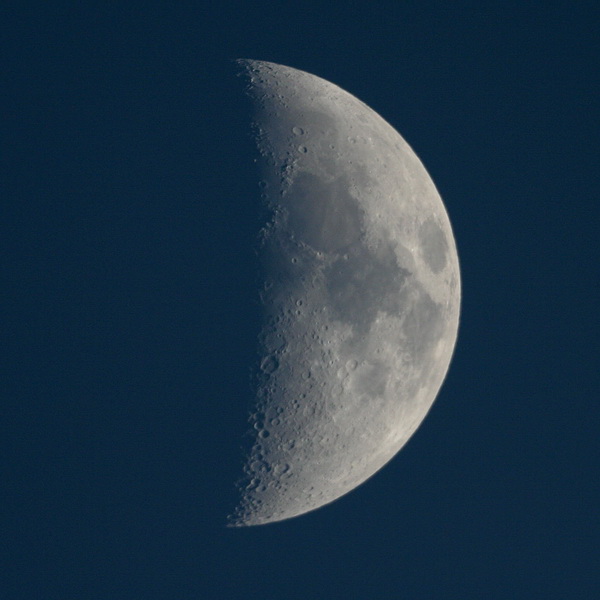
Der Mond/The Moon
|
|
|
|
|
|
In die Tiefe |
Into deep sky |
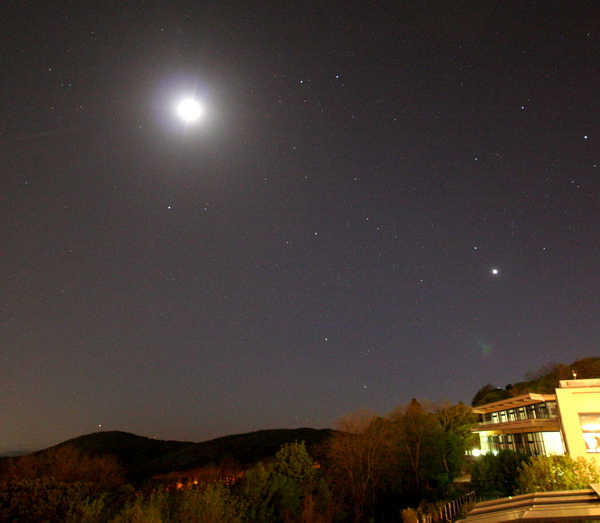
Nachthimmel mit Mond und Venus/Night sky featuring the Moon and Venus
|
Je später und je dunkler es wird, desto mehr Objekte werden sichtbar. Nach Mond und Venus zeigen wir noch die beiden Planeten Mars und Saturn. Noch später sind dann auch noch Doppelsterne und Sternhaufen unser Ziel. |
The later the evening and the darker it gets, the more objects become visible. First, we show two more planets, Mars and Saturn. Later on, we can also show stellar objects like double stars and star clusters. |
|
|
|
|
Astronomie ohne GrenzenHier auf dem Kahlenberg ist ein idealer Platz, um den Nachthimmel mit Menschen aus vielen Ländern zu teilen. Der Ort ist als Touristenattraktion bestens dafür geeignet. Doch auf dem Kahlenberg wird uns auch bewusst, dass der Sternenhimmel ein immer seltener Anblick wird in der Nähe einer großen Stadt. Es gibt also viele Botschaften, die wir hier transportieren können am Astronomietag und am globalen Teleskoptreffen. |
One people, one skySharing the wonders of the night sky with people from many countries, yes, we can do that here at Kahlenberg. And we did it. The location is suitable from that point of view that this is a touristic hot spot. But Kahlenberg also makes us aware that the night sky becomes a rare view in the vicinity of big cities like Vienna. So, there is a lot of messages to be transported here at Astronomy Day and Global Star Party. |
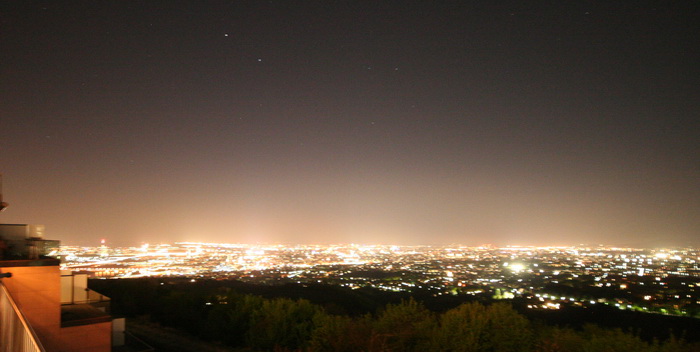
Saturn und Spica über dem Lichtermeer von Wien/Saturn and Spica fight against the city lights of Vienna
Alexander Pikhard

|
Wiener Arbeitsgemeinschaft für Astronomie. www.waa.at |